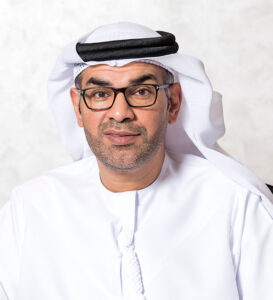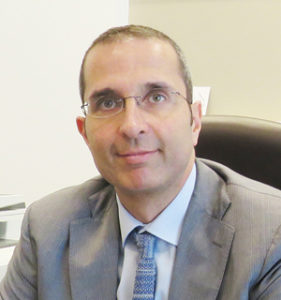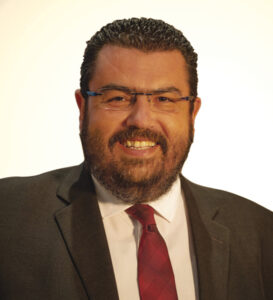For Ras Al Khaimah Municipality’s Energy Efficiency and Renewables Office (Reem), the COVID-19 pandemic became a catalyst for the acceleration of its retrofit and energy management programmes. Hannah Jo Uy has the story…

H.E. Munther Mohammed bin Shekar
Like many government entities the world over, Ras Al Khaimah Municipality has had to grapple with unforeseen circumstances following the outbreak of COVID-19. However, these unexpected challenges have not hindered Ras Al Khaimah Municipality in its move towards sustainability, with H.E. Munther Mohammed bin Shekar, its Director General, saying that the Municipality remained steadfast in its collective efforts to implement its energy-efficiency programmes. “When faced with grim reality,” he says, “you always have two options – allow it to pull you down or try to identify the opportunities it brings and take advantage of them. We chose to do the latter.”
Following this line of thinking, bin Shekar says, Ras Al Khaimah Municipality has made a concerted effort in identifying opportunities for action during these unprecedented times. It is important to note that COVID-19 has triggered deeper consciousness related to cost, he points out. “As economies worldwide entered into lockdown mode, at different levels of depth, revenue streams for many were affected,” he says. “This placed a lot of pressure on cost reduction, and energy efficiency and renewables are two excellent areas of intervention that allow businesses to reduce their operating costs.”

Andrea Di Gregorio
Andrea Di Gregorio, Executive Director of the Energy Efficiency and Renewables Office (Reem) of Ras Al Khaimah Municipality, points out that lockdown measures also meant that for a temporary period, some facilities were either totally or partially shut down. He says this provided a unique opportunity for stakeholders to pursue retrofits without the typical problems, constraints and restrictions – including disruption of operations, which would have meant an inconvenience to customers. Di Gregorio says these factors prompted an assessment of current retrofits being rolled out at various stages, and led to the acceleration of some projects, in order to take advantage of the special conditions.
With regard to the impact of the changing economic scenario on the pipeline of retrofit projects, Di Gregorio says that Ras Al Khaimah Government managed the ongoing tenders with greater flexibility, in collaboration with the selected ESCOs. “We also had to make some adjustments and changes to some projects in the final stages of negotiation, to accommodate certain budget requirements that the COVID-19 pandemic also brought as a side effect,” he says. “These projects were not compromised, which we believe to be quite an achievement under the very particular conditions of the world economy, but rather rearranged to allow the spread of the investment over a longer period. In collaboration with the Department of Finance, we identified strategies that will allow us to move forward, because we firmly believe that energy savings can be a strong contributor to bottom-lines of businesses in these new circumstances.”
Di Gregorio says that Reem also took the COVID-19 pandemic challenge as an opportunity to accelerate the energy management programme. “Ras Al Khaimah Government entities are currently pursuing quick-wins in energy savings without the need for any additional investment,” he says. “COVID-19 was used as a catalyst for the initiative, since every Government employee was aware of the challenges it posed, and that
we all needed to contribute to overcome those challenges.” Under this initiative, Di Gregorio says, Reem introduced a number of
practices that each entity can apply, which includes collection and reporting of energy consumption information, communication
and awareness for internal dissemination, adjustment of AC temperature set points to 23 degrees C and switching off unnecessary equipment, among others, in an effort to identify and eliminate minor energy wastage in day-to-day operations. “All government entities
in Ras Al Khaimah are participating by taking action and sharing learnings with others through an organised process. A wide set of actions has already been implemented and others are in the roadmap to be implemented in the next weeks and months, contributing to a more energy-efficient operation of Ras Al Khaimah Government as a whole.”
Navigating shifting occupancy profiles

Henrique Pereira
Elaborating on another dimension related to Reem’s scope of activities, Henrique Pereira, its Senior Manager, Energy Services, says that the Office has also taken into close consideration the shift in energy consumption trends across the emirate, following changing occupancy profiles in view of COVID-19 lockdown measures. He explains that this shift has to be reflected in ongoing retrofits as adjustments to the energy savings in the projects. “Such an exceptional event had an unexpected impact on the occupancy and operations of the buildings, and this has to be reflected in the measurement and verification (M&V) processes for the different ongoing projects,” he says. “This is being done following International Performance Measurement and Verification Protocol (IPMVP) standard, in particular for what concerns non-routine adjustments.”
Pereira says that the changing occupancy profiles also created some additional challenges for ongoing investment grade audits (IGAs) and tenders. “For the IGAs, the solution was to extend their duration to also encompass periods of higher occupancy after the critical point of lockdown,” he says. “Certain rationales were also applied for the different projects under IGA, to allow for accurate energy modelling despite the disruption caused by the COVID-19 effects. For the tenders, in most cases, the decision was to extend the proposal submission deadline to allow a longer time for measurements.”
Lastly, Pereira says, the team had to adjust all the calculations of savings from the energy management initiatives, taking into consideration these new trends. “As described previously, the initiative for the whole Ras Al Khaimah government was started during the lockdown period, so we needed to carefully circumvent that period from our savings calculations,” he says. “We chose to use January and February as representative months for the pre-COVID-19 period, as the lockdown was not yet in effect. We disregarded the period from March to April from the savings calculations, as the savings achieved were mainly due to the lockdown effect. We started calculating savings from May onwards, when a sense of normality had returned.” Pereira says that as of the time of the interview for writing this article, occupancy is almost back to pre-COVID levels and that the majority of the savings that are being achieved are now mostly due to the energy-efficiency measures that have been taken.
Numbers game
These concerted efforts have led to positive results, Di Gregorio says. “We are happy to report that on the energy management initiative for the Government of Ras Al Khaimah, from the first months of activation, we were able to achieve over 10% of savings in energy and water consumption due to the efficiency measures that have been taken”, he says. “Since there were no investments made in equipment to achieve these savings, the benefit was perceived immediately. Of course, we will need continuity of effort to maintain and improve this performance. However, the initiative proves that a well-defined energy management process can quickly lead to important returns compared to the very limited cost that it entails.”
Di Gregorio says that Ras Al Khaimah has also surpassed AED 7 million of yearly guaranteed savings from contracted retrofit projects, and more savings will come in the near future from a pipeline of several hundred buildings, currently at different stages of the evaluation and tendering process. “All these projects have not only their savings guaranteed for a minimum five-year period, but they also have an average payback time between three and four years, with some cases even below three years,” he says. “This is a clear demonstration that investments in energy efficiency are some of the best investments any business can make to reduce their operational costs and improve their bottom-line results.”
A learning process
For Pereira, the past few months have been a learning experience for the Reem office, especially in testing and reporting the value of increasingly connected systems and digitalisation. “The habit disruption that COVID-19 brought also taught us that operational optimisation based on ‘fixed controls’, such as equipment scheduling or similar, is not flexible enough to accommodate the rapidly changing environment,” he says. “We need to have ‘smart controls’ in place that can react quickly and effectively to the changes in occupancy, working hours, operational usage of spaces and cooling requirements. Only then can we truly minimise the inefficiencies that otherwise will be present in the day-to-day operations.”
Agreeing, Di Gregorio adds that involvement of all building users is also paramount to the success of various energy-efficiency initiatives. “It has to start with an awareness and communication plan to make sure everyone understands the challenges and what each one can do to help,” he says. “Simple, concrete measures that are reflected in actual, measurable results that are, in turn, shared with everyone, closing the loop. If this loop is effectively made, people become more and more engaged and interested in seeing how their involvement and actions lead to concrete and recognised results.”
Copyright © 2006-2025 - CPI Industry. All rights reserved.